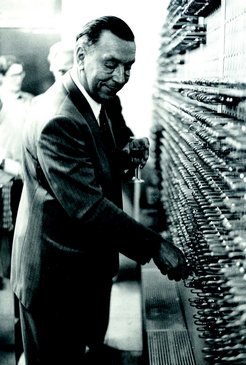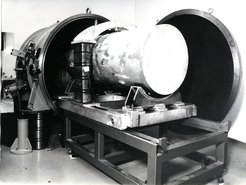Obituary to Heinz Billing
Born on 7 April 1914 in Salzwedel, Heinz Billing finished high-school in 1932 and then moved to Göttingen for his studies, which for him was the "stronghold of mathematics", as he wrote in his autobiography. After his doctoral thesis at the University of Munich in 1938 with a mirror-rotation experiment on the wave-particle dualism of light, he applied at the aerodynamic experimental institute (AVA) in Göttingen. However, he was called to military service and could only return to the AVA in 1941, when he was named "indispensable" for developing microphones to identify enemy aircraft based on their propeller noise.

After the end of the Second World War, several institutes of the Kaiser Wilhelm Society (the predecessor of the MPG) moved into the mainly empty buildings of the AVA, the Institute for Physics and the "Institute for Instrumentation", founded in 1946. Starting in 1948, there Billing developed his first calculation engine with a magnetic drum memory, a technology he was familiar with due to his experiments with noise suppression. The G1 - "Göttingen 1" - was completed in 1950 and operated with a binary code just like today's computers, i.e. with representations for zero and one. An arithmetic operation took about one second, the memory could store up to 26 numbers - no match for today's computers, but at the time the G1 was about ten times faster than the more common mechanical computing machines.
In particular the astrophysicist Ludwig Biermann (1907-86) showed great interest in the calculation engine and encouraged Billing to develop it further. In 1955 the G2 was finished and in 1960 the G3 (in operation until 1972), which could manage 5000 to 10 000 operations per second. Still, many scientists were quite sceptical about this new technology. An astrophysical working group from Heidelberg asked the Göttingen group to calculate the orbit of a newly discovered asteroid. The results of the G2 differed significantly from those of the computing group, which had worked with mechanical table-top devices, and this was interpreted as a failure of the Göttingen computer. Later observations, however, showed the asteroid appearing at Göttingen's predicted position - the machine had yielded a better result than the traditional computing group.
In 1961 Billing was appointed Scientific Member of the MPI for Physics and Astrophysics, which had moved from Göttingen to Munich in 1958. In 1968, Billing became chairman of the newly founded "Advisory Committee for Computer Systems in the Max Planck Society" (BAR) due to the increasing importance of computer systems for solving scientific tasks. After stepping down as chairman, Billing was a member of the BAR until 1998. Since 1993, the "Heinz-Billing-Award for the Promotion of Scientific Computing" has been awarded by the Heinz-Billing-Association for the Promotion of Scientific Computing e.V., an association founded within the Max Planck Society.

Weighty experiment: The Billing group used a massive aluminium cylinder like this at the beginning of the 1970s in their search for gravitational waves.
Although Heinz Billing was a computer pioneer, he did not pursue industrial development of his computers. Instead, he returned to physics and tried from 1970 onwards to verify the gravitational wave experiment of Joseph Weber. Therefore, he and his group built heavy aluminium cylinders in Munich and Frascati, Italy, as gravitational wave detectors. These could register relative changes in length of the order of 10-15. The results were negative (as expected); the method was not sensitive enough to detect the theoretically predicted signals. Therefore the group turned to the new technique of laser interferometry; in 1975 the first prototype was built in Garching. These experiments were the starting point for the successful detection of gravitational waves in September 2015, which Billing lived to see with 101 years.
Billing received numerous honours and awards. Among others, he was appointed Honorary Professor of the Friedrich Alexander University Erlangen-Nuremberg in July 1967 and was the first to receive the Konrad-Zuse-Medal from the Gesellschaft für Informatik. In 2006 the Bavarian Maximilian Order for Science and Art was bestowed upon him. He became honorary citizen of Salzwedel in 2013 and in 2015 received the Federal Cross of Merit first class of the Federal Republic of Germany as well as the Golden Merit Medal of the city of Garching in 2016, where he lived for more than 40 years. Billing died on 4 January 2017 at the age of 102 years.

